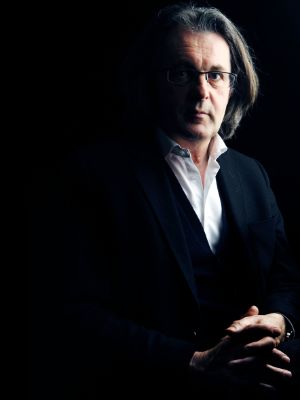

Pascal Dusapin © Philippe Gontier
Pascal Dusapin
The compositional influences on pascal Dusapin, born in Nancy in 1955, are as diverse as the non-musical forms of his inspiration. He referred to Edgar Varèse as his “musical grandfather” and Iannis Xenakis as his “musical father”. Between 1974 and 1978, Dusapin attended composition courses given by Xenakis at the Sorbonne which not only provided major impulses, but also awakened his interest in mathematics and architecture. While Dusapin was still at the Sorbonne studying art and aesthetics, he participated in Olivier Messiaen’s composition classes as a guest student in 1976. Francesco Donatoni and Hughes Dufourt provided additional significant support in Dusapin’s largely autodidactic early years of his compositional career which began with “Souvenir du Silence” (1976) for 13 strings.
Dusapin’s preoccupation with literature and intellectual history was also significant for his works. This is particularly noticeable in his compositions for the stage: his first opera “Roméo & Juliette” (1986) was based on the close relationship between the music and the rhythm and tonal quality of the text by the author Olivier Cadiot; “Medeamaterial” (1991) is a homage to Heiner Müller and his drama of the same name and “To be sung” is a reflection of the works of Gertrude Stein. He created his own librettos for his operas “Faustus”, “The Last Night”, premiered at the Staatsoper Unter den Linden in 2006 and “Passion”, based on the Orpheus myth, which received its first performance at the Festival Aix-en-Provence in 2008. In “Penthesilea” (WP 2015 at La Monnaie in Brussels), he focused on the life and work of Heinrich Kleist. “Macbeth Underworld” was also composed for Brussels.
Dusapin’s close connection to literature and the expressive potential of the human voice is also displayed in his extensive body of vocal compositions. In his lied cycle “O Mensch!” (2012), he undertook an expressive, multilayered and personal exploration of Friedrich Nietzsche’s poetry. In “Disputatio” (2014) for choir, glass harmonica and string orchestra, he developed a dialogue consisting of early medieval texts on the nature of existence. “To be quite honest, I do not differentiate in any way between instruments and the human voice – everything is song,” Dusapin comments. The majority of his many chamber music works, solo concertos and orchestral compositions also take their inspiration from existential impulses and ideas from literature, philosophy and art.
Dusapin has received many accolades: the Academy of the Fine Arts Prize in 1993, the SACEM Prize for Symphonic Music in 1994 and the Grand Prix National de Musique awarded by the French Ministry for Cultural Affairs in 1995. In November 2020, Dusapin received a commission from the French President Emmanuel Macron to compose the music for the Panthéonisation of the French writer and chronicler of World War I, Maurice Genevoix. Dusapin was composer of residence at the Dresden Philharmonic during the season 2024/25.
As of: February 2025
